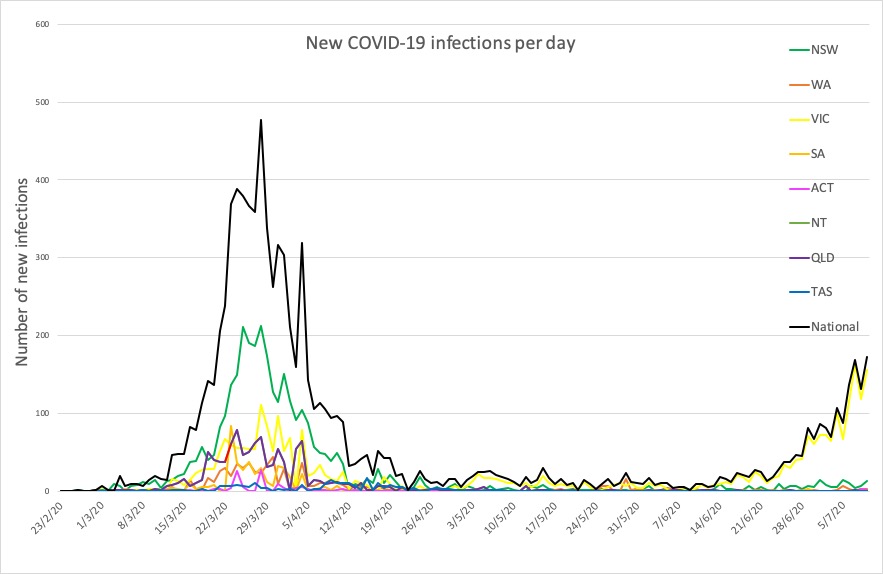The effects of COVID-19 appear to persist for months after infection, with nearly nine in ten patients reporting symptoms such as fatigue, shortness of breath, joint pain and chest pain.
Welcome to The Medical Republic‘s COVID Catch-Up.
It’s the day’s COVID-19 news into one convenient post. Got any tips, comments or feedback? Email me at bianca@biancanogrady.com.
10 July
- COVID-19 symptoms last for months in many patients, study finds.
- Masks are not generally recommended, says Federal health department.
- Breastfeeding mothers with COVID-19 should practice infection control but still breastfeed.
- ‘Intubation box‘ may make aerosol exposure during intubation worse, not better.
- Several more healthcare workers test positive to COVID-19 in Melbourne.
- The effects of COVID-19 appear to persist for months after infection, with nearly nine in ten patients reporting symptoms such as fatigue, shortness of breath, joint pain and chest pain.
A research letter published in JAMA described outcomes in 143 patients who were hospitalised with COVID-19 and followed up for a mean of 60 days after onset of symptoms.
Researchers found only around 12% of these patients were completely free of COVID-19 symptoms. Nearly one-third reported one to two symptoms, more than half had three or more symptoms, and 44% reported worsened quality of life.
“Clinicians and researchers have focused on the acute phase of COVID-19, but continued monitoring after discharge for long-lasting effects is needed,” the authors wrote. - The Federal Government is holding the line on mask-wearing, saying in a statement today that its advice has not changed: masks are not generally recommended, but “wearing a mask can help protect you and those around you if you are in an area with community transmission, and physical distancing is not possible, like on public transport.”
This contrasts with the latest advice from the Victorian government, which is now advising all Victorians in the hotspot areas of Melbourne and Mitchell shire should wear masks if they have to leave their home and physical distancing is not possible. - Women with COVID-19 who are breastfeeding should use infection control and prevention measures such as mask and hand hygiene while breastfeeding, according to the latest update from Australia’s National COVID-19 Clinical Evidence Taskforce.
The taskforce, which is constantly reviewing new research on COVID-19, has also stated that chloroquine and colchicine should only be used as a treatment for COVID-19 in clinical trials. - Among the many innovative technologies that have been considered during this pandemic as a means of reducing transmission, the ‘intubation box’ was one did catch TMR’s eye way back in the early days. It consisted of a clear plastic box with glove holes and a plastic fabric edge, which all fitted over the patient’s head and was intended to enable intubation while minimising healthcare worker exposure to viral aerosol particles.
But not so, it seems. According to a study published in Anaesthesia, an in-situ simulation of the box has shown that it not only fails to reduce airborne particle exposure, but may actually increase exposure.
“During testing, it was also noted by investigators that clouds of aerosolised particles escaped from the arm openings of the aerosol box towards the laryngoscopist with each patient cough,” the authors wrote.
Back to the drawing board. - Victoria recorded 165 new cases over COVID-19 on Thursday, 30 of which are linked to known outbreaks but the rest are still under investigation. Several more healthcare workers have tested positive, including at Sunshine Hospital’s emergency department and more aged care facilities such as Aurrum Aged Care and Holmwood Aged Care.
However, according to the Victorian Chief Health Officer, the daily number of new cases in Victoria is what the US is seeing every 10 minutes.
The ACT has recorded another new case, who is a contact of a previous case. Twelve of NSW’s thirteen cases are returned travellers in hotel quarantine.
Here are the latest confirmed COVID-19 infection figures to 9pm Thursday:
National – 9059, with 106 deaths and 7575 recovered
ACT – 112
NSW – 3453
NT – 30
QLD – 1068
SA – 443
TAS – 228
VIC – 3059
WA – 627



